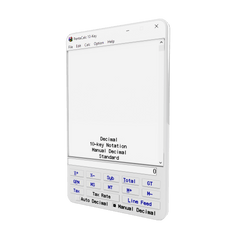Number systems are the technique to represent numbers in the computer system architecture, every value that you are saving or getting into/from computer memory has a defined number system.
The Pentacalc Programming Calculator performs several logical, shifting, rotating, and other miscellaneous operations.
Converting Between Bases
With PentaCalc, you can convert quickly between binary, octal, decimal, and hexadecimal bases.
Logical Operations: AND, OR, NOT and XOR
Logical operations are very useful for boolean testing, and conditional statements. AND, OR, and XOR are binary operators, meaning that two operands are required to complete the calculation. NOT is a unary operator, meaning that only one operand is required to complete the calculation.
With Pentacalc, perform AND, OR, NOT, and XOR operations
Shifting and Rotating
Shifting and rotating are very fast and convenient ways for computers to do multiplication and division by factors of 2, and various other bit manipulations. The programming calculator allows 8 different kinds of shifting and rotating, including signed and unsigned shifting and rotating, with and without carry.
Modulus
[Mod] computes the integer remainder of a division of two operands.
Extend
[Ext] copies the most significant bit of an operand until it fills the remaining bits of the specified word size under certain conditions. [Ext] is intended to allow you to enter or compute a smaller number than the specified word size and then fill the remaining empty bits so that the number is in proper two's complement format.
Reverse
[Rev] exchanges the bits around the middle of the specified word size. The most significant and least significant bits are exchanged. The second most significant and second least significant bits are exchanged, and so forth.
Swap
[Swap] exchanges the upper half of the specified word size with the lower half. All bits in each half will maintain their orientation with respect to each other. They will only be moved to the opposite half.














